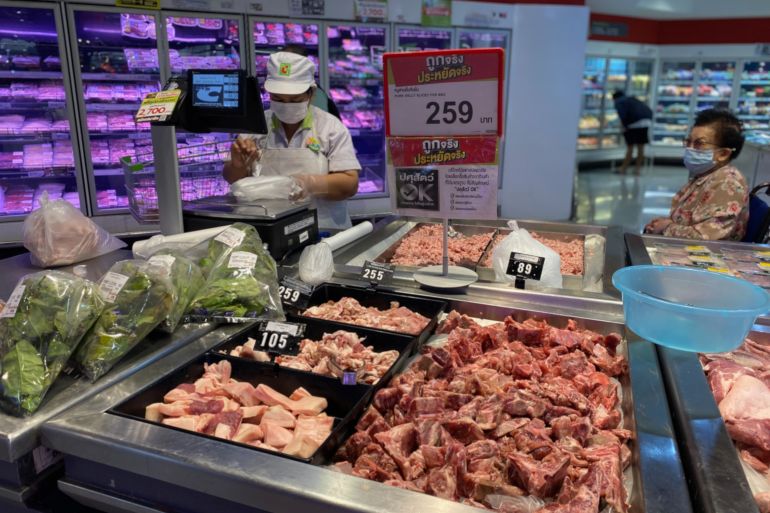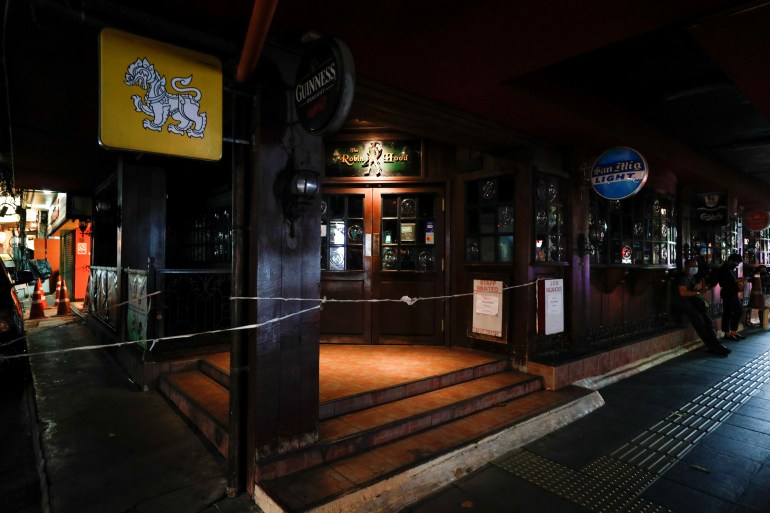Ahead of Lunar New Year, Thailand’s poor feel sting of inflation
Pork prices have soared 40 percent since the start of the year amid a perfect storm of swine flu and rising oil prices.

Bangkok, Thailand – Instead of raising the cost of a dish, noodle seller Yajai is putting less pork in her bowls – a cutback forced by the surging price of Thai pigs following an outbreak of African swine flu.
In a nearby alley, a fruit seller cuts smaller pieces of papaya, guava and pineapple to avoid passing on rising prices to her regulars.
Keep reading
list of 4 itemsAs Chinese shun parenthood, firms dangle bonuses, loans and leave
Hong Kong could stay COVID hermit until 2024, business body warns
‘Systematic fear’: How India battered press freedom in Kashmir
The cost of eggs, cooking oil, gas and chicken have also shot up, baffling small business owners across Pratunam, a working-class, Thai-Chinese neighborhood in downtown Bangkok.
“My costs are up by 20 percent since the start of the year,” Yajai told Al Jazeera. “Coconut milk, cooking oil, even the wonton wrappers … I’ve never seen anything like this where everything goes up at once,” she said. “It doesn’t make any sense.”
As the Lunar New Year festival looms – a time when families normally spend liberally and small businesses get their first bounce of the year – Thais are being battered by inflation.
That is leaving poorer households short of money after two years of pandemic-crunched incomes, small businesses leaking profit – and an unpopular government scrambling for a fix.
Economists say surging global oil prices have raised costs across supply chains, including Thai production lines and transport networks for key goods such as animal feed.
But in a perfect storm, Thai authorities earlier this month announced swine flu had hit the kingdom’s nearly 20 million pigs, threatening mass culls and prompting bans on pork imports by Taiwan and Cambodia.

Since the start of the year, the price of pork has soared about 40 percent to 200-230 baht ($6-7) a kilogramme. With pork suddenly out of reach, poorer families are buying more chicken, in turn pushing up the prices of poultry and eggs – the essential ingredient in wonton wrappings.
Instead of the usual bounce before the Lunar New Year, which begins on February 1, markets in working-class areas of Bangkok are markedly subdued.
“A lot of people have gone back upcountry until prices drop,” Poonya Sugurd, 49, a grocer at a large fresh market in a Bangkok suburb, told Al Jazeera, explaining she has cut back on orders to avoid the leftover stock.
“Even the price of joss paper has gone up,” she said, referring to the paper many Asian communities burn to honour their ancestors on holidays and at family gatherings. “I’m trying to absorb the extra costs because I realise the pandemic has hurt my customers already.”
In one of Asia’s least equal societies, inflation is not being felt evenly. While the poor feel every extra baht, Bangkok’s wealthy people are likely to be untroubled by the rising costs.
“We have a real wealth gap here,” Viroj NaRanong, an economist at the Thailand Development Research Institute, told Al Jazeera.
“Soaring food prices will not affect those [wealthier] folks who value their Chinese New Year tradition more than the price of goods.”
Thai economists have played down the link with the United States’ surging inflation – at a nearly 40-year high – although petrol pieces and the shipping container shortage over the last year have passed on costs.
In addition to rising global oil prices, “the current rising food prices stem from the supply shock of pork – which is pushing other meat prices up”, Anusorn Tamajai, a former Bank of Thailand board member, told Al Jazeera.
“Unlike the US, Thailand’s inflation isn’t worrying … inflation should not go above two percent here and the prices of goods won’t keep rising all year. It is temporary.”
Political implications
Nonetheless, the political implications of the rising costs have left the government of Prayuth Chan-ocha, a former army chief who took power in a 2014 coup, scrambling for solutions.
Last week, the government pledged $42m for the next three months to subsidise the cost of chicken, eggs and pork at 3,000 distribution points across the country.
Meanwhile, the Commerce Ministry has urged consumers to call a special hotline to report price-gouging, threatening to prosecute wrongdoers with fines and jail time.
Prayuth has prompted the scorn of his parliamentary opposition – and many Thais on social media – for shifting responsibility from his government to alleged hoarders, as well as proposing solutions widely viewed as glib.
“If the pigs are dead, then breeding new pigs should be the top priority,” he told reporters last week.
Memes of Prayuth 3-D printing piglets immediately rattled across Twitter, accompanied by the hashtag, “How do you breed a new prime minister?”
The opposition has accused the government of being out of touch with a country whose gross domestic product (GDP) contracted a record 6.1 percent in 2020 and is struggling to rebound amid the emergence of the Omicron variant of the coronavirus.
“I invite the PM and the Commerce Minister to leave their air-conditioned rooms and take a trip into the real world and see how people are struggling,” Tasanee Buranupakorn, an MP for the opposition Pheu Thai Party, said in parliament last Wednesday.
Anusorn, the ex-central banker, said point scoring was to be expected, but warned the combination of rising living costs, low wages and high household debt had the potential to cause “social unrest” if left unaddressed.
At Yajai’s noodle shop, angst is building.
“They [the government] have been very slow at handling this crisis,” she said.
“My profit margin is down, but the state collects my taxes just the same.”